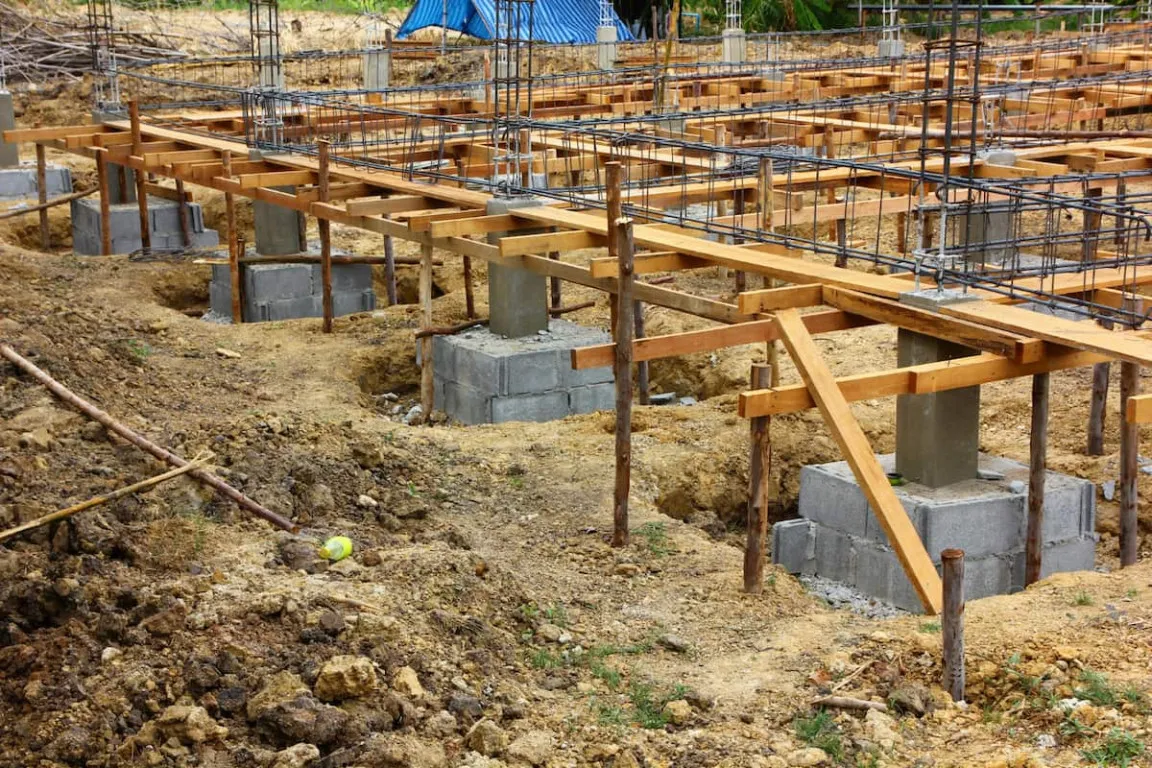There are various types of foundations used to support buildings, such as Strauss pile, bored pile, and precast concrete pile foundations. Bored pile is one type of foundation that has a high bearing capacity and is suitable for various construction applications.
Besides offering flexibility in its application, bored pile foundations also have some drawbacks that you need to know about. So, what is a bored pile foundation, and what is the process of making this type of foundation? Check out the following explanation!
What Is a Bored Pile Foundation?
Bored pile foundation is a type of foundation that is shaped like a cylindrical tube and is implanted vertically into the ground. This foundation is made of concrete reinforcement and functions to withstand the structural weight of the building while transferring it into the soil layer.
Generally, bored pile foundations are made in buildings located in highly populated areas because the installation of these foundations does not cause significant ground movement. In addition, this type is also often used as an alternative if pile foundations cannot be applied.
The size of a bored pile foundation is dependent on the type of pile hole used and the soil conditions on which it is built. This type of foundation usually has diameters of 20 cm, 30 cm, and 40 cm, with a length of about 5 m. The applications of each of these sizes are:
- 20 cm: Small and medium-sized projects.
- 30 cm: Medium-sized projects such as shop construction.
- 40 cm: Large projects such as flyovers.
In addition, to determine whether these foundations can safely withstand the building weight, bored pile foundation calculations need to be done. The required calculations include bored pile bearing capacity, permit bearing capacity, and settlement check.
Types of Bored Pile Foundations
Bored pile foundations are divided into 3 based on the techniques and tools used during manufacturing. The bored pile types in foundations include:
1. Mini Crane Bored Pile Foundation
As its name suggests, the mini crane bored pile foundation utilizes a mini crane tool in its manufacture. This type of foundation does not produce vibrations, which makes it suitable to be applied in residential areas. Generally, this type involves the application of the wet drill method.
2. Gawangan Bored Pile Foundation
Hand-held bored pile foundation is a type that utilizes a bored pile tool to produce an excavation hole with a larger diameter than the mini crane bored pile foundation. This type of bored pile foundation is suitable for use in narrow areas.
3. Strauss Pile Foundation
If the previous type utilizes certain equipment, the Strauss pile foundation uses human labor in the manufacturing process, so it is often referred to as manual drilling. In this type, the technique that is often used is the dry drill method.
Read also: Chicken Claw Foundation: A Crucial Structural Component
Bored Pile Foundation Manufacturing Process
Bored pile foundations are made through a method of drilling into the soil layer to a certain level of depth. This drilling technique is done repeatedly, but at relatively low vibration levels so as not to disturb the surrounding buildings.
When installing this foundation, the recommended depth is around 10-20 meters. It is intended that this foundation can reach the appropriate soil layer so that it can support the weight of the building structure optimally.
In general, the drilling depth is influenced by location factors and ground conditions where the foundation will be made. In some cases, the drilling depth can reach a layer of rock that is quite hard.
With the drilling method, the bored pile foundation in the form of steel reinforcement can be well embedded into the ground. Once the steel reinforcement is in place, the structure will be filled with concrete material in accordance with the applicable standards.
Advantages of Bored Pile Foundations
In the field of construction, bored pile foundations offer a lot of advantages that can be utilized further. The advantages of bored pile foundations include:
1. Has High Support Power
The drilling depth of a bored pile foundation makes it capable of supporting large structural weights effectively. With deep drilling holes, bored pile foundations can transfer structural weight to the ground and keep the building stable.
2. Suitable for Clay Soil Types
It is important to note that areas with clay soils are generally at risk of movement and expansion that can destroy building structures. In these conditions, a bored pile foundation can be the right solution because it is able to reach more stable soil layers.
3. Can be Applied in Limited Areas
The next advantage of a bored pile foundation is that it is flexible to be applied in limited areas. This is because the drilling process of this foundation can be done precisely, so that it does not require dredging soil that is too wide.
4. Suitable for Various Construction Applications
Bored pile foundations can be applied in various construction applications, such as schools, docks, bridges, and high-rise buildings. The ability of bored pile foundations to support huge weights stably makes them flexible enough to be applied.
5. Low Noise Level during Construction
In high-density areas, the noise from loud construction projects can be a nuisance for residents. But this does not apply to bored pile foundations as they have a fairly low noise level.
Read also: Foundation for A 2-Story House: Types & Key Influencing Factors
Disadvantages of Bored Pile Foundations
Although it has advantages, bored pile foundations also have some disadvantages that you need to know. Some of the disadvantages of bored pile foundations are:
1. The Cost Tends to Be Expensive
Making a bored pile foundation requires a complicated drilling and casting process also needs sophisticated equipment. This allows construction costs on bored pile foundations to be higher when compared to other types of foundations.
2. Less Suitable for Some Soil Types
Bored pile foundations are less suitable for sandy and gravelly soil types that are prone to landslides. In these types of soils, the application of bentonite is more recommended because this material can hold the soil to prevent landslides.
3. Needs Complex Maintenance
If a problem occurs with a bored pile foundation, the repair process can be costly because the technique is quite complicated, especially if the depth used is quite significant. Therefore, the installation of this type of foundation must be done properly and correctly.
That’s all the explanation of what a bored pile foundation is, along with its types, manufacturing process, advantages, and disadvantages. In order for the bored pile foundation to optimally support the building structure, the selection of materials for concrete filling during casting needs to be considered.
Therefore, after getting to know the structure of a bored pile foundation, it is the right time to look for suitable casting materials, especially regarding the selection of cement. You can easily get high-quality, premium cement at Semen Merah Putih.
Through one of its subsidiaries, Beton Merah Putih, Semen Merah Putih supplies innovative ready-mixed concrete products designed for a variety of unique and strong applications through its excellent products, such as Ready-Mixed Concrete, Precast Concrete, and Aggregates.
Ready mix concrete products from Beton Merah Putih are designed for a variety of applications according to consumer demand, are available in a several selection of grades and can be used for the building of various constructions such as industrial, commercial, and also for infrastructure which includes the construction of high-rise buildings, residential, roads, and other constructions.
For more information about Semen Merah Putih products and services, please do not hesitate to contact us!
Read also: How to Calculate Foundation Volume Based on Its Type



